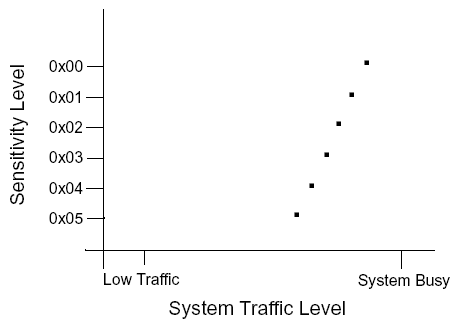
You are here: CSP Developerís Guide: Overview†>†4 EXS API Application Development†>†System Busy Warning and System Busy Alarm
System Busy Warning and System Busy Alarm

The CSP sends a System Busy Warning in the Alarm message to indicate that the traffic volume on the CSP is approaching its capacity. This message is only a warning; it does not mean a System Busy condition will definitely occur. When the CSP is overloaded by a high volume of traffic, it sends a System Busy alarm to the host. The alarm indicates that the CSP cannot process any more incoming or outgoing calls until the condition clears.
Subsequent messages from the host may or may not be lost, but Dialogic recommends reducing the hostís call processing until the System Busy condition clears.
Using the Data[0] byte in the System Configuration message, you can specify what volume will trigger the System Busy Warning message. This setting affects the amount of time the host has to respond to a potential System Busy condition. The least sensitive setting (0x00) gives the host the least amount of time between a System Busy Warning and a System Busy condition. The most sensitive setting (0x05) gives the host the most amount of time between a System Busy Warning and a System Busy condition.
The actual time between a System Busy Warning and a System Busy condition cannot be calculated precisely. We recommend testing the CSP to find an appropriate sensitivity level for each application.
Determining System Busy
The graph below shows the relationship between the sensitivity level and the amount of warning time as the system approaches a System Busy condition. The dots in the graph represent the point at which a System Busy Warning alarm is sent to the host.

System Busy Cleared
When the busy condition clears, the CSP sends the Alarm Cleared message to the host.
Two alarms pertaining to system memory are reported with the Alarm (0xB9) message.
ē 0x1F - System Memory Low Alarm (General/Major)
The CSP sends a System Memory Low Alarm when system memory has dropped below the minimum level of satisfactory performance. When the system is in this condition, it is also in a System Busy condition and the CSP sends a System Busy Alarm (0x01) to the host.
ē 0x20 - System Memory Satisfactory (General/Informative)
When the system returns to the minimum level of satisfactory performance, the CSP sends a System Memory Satisfactory Alarm (0x20) to the host, along with an Alarm Cleared (0xC1) message.
Software errors that are not severe enough to cause a system fault are reported as an informative card alarm in the Alarm message. If you receive a Software Error Alarm (0x17), please forward the data to Dialogic Technical Support.